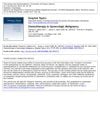 35 citations,
August 2001 in “Journal of Cutaneous Medicine and Surgery”
35 citations,
August 2001 in “Journal of Cutaneous Medicine and Surgery” Tacrolimus is effective for various skin conditions with fewer side effects than cyclosporine.
[object Object]  19 citations,
June 2020 in “International Journal of Dermatology”
19 citations,
June 2020 in “International Journal of Dermatology” Low-dose oral minoxidil effectively treats non-scarring hair loss with some side effects like hypertrichosis and postural hypotension.
 4 citations,
July 2001 in “Journal of Cutaneous Medicine and Surgery”
4 citations,
July 2001 in “Journal of Cutaneous Medicine and Surgery” Tacrolimus is an effective treatment for several skin conditions with fewer side effects than cyclosporine.
 2 citations,
May 2022 in “Cutis”
2 citations,
May 2022 in “Cutis” Taking too much Albendazole can cause hair loss and other serious side effects.

Taking too much Albendazole can cause hair loss and other serious side effects.
 July 2017 in “International Journal of Dermatology and Venereology”
July 2017 in “International Journal of Dermatology and Venereology” Phototherapy can improve various types of hair loss with minimal side effects, but more research is needed to optimize treatment.
 November 2019 in “Actas Dermo-Sifiliográficas”
November 2019 in “Actas Dermo-Sifiliográficas” Oral minoxidil helps treat hair loss and has reversible side effects.
31 citations,
August 2018 in “Journal of biomedical nanotechnology” Licorice root-derived nanoparticles target liver cancer cells to improve treatment and reduce side effects.
 21 citations,
January 2019 in “Elsevier eBooks”
21 citations,
January 2019 in “Elsevier eBooks” Green-synthesized nanoparticles can effectively target cancer cells, reducing side effects and improving treatment.
 7 citations,
October 2019 in “Annals of palliative medicine”
7 citations,
October 2019 in “Annals of palliative medicine” New targeted cancer drugs can cause skin side effects, and managing them requires patient education and timely care.
1 citations,
April 2023 in “Heliyon” Disitamab vedotin and gemcitabine effectively treated bladder cancer without major side effects.
 June 2024 in “British Journal of Dermatology”
June 2024 in “British Journal of Dermatology” Permanent hair loss from chemotherapy significantly impacts patients' mental health and social life, highlighting the need for better patient education and support.
[object Object]  25 citations,
June 2020 in “Dermatology practical & conceptual”
25 citations,
June 2020 in “Dermatology practical & conceptual” Scalp cooling can help prevent hair loss from chemotherapy, but treatment should be tailored to the individual and more research is needed.
 10 citations,
January 2015 in “Journal of Cutaneous Medicine and Surgery”
10 citations,
January 2015 in “Journal of Cutaneous Medicine and Surgery” Cold caps and certain drugs may help prevent or reduce hair loss from chemotherapy, but more research is needed.
27 citations,
May 2016 in “Integrative Cancer Therapies” Chrysin makes docetaxel more effective and reduces its side effects in lung cancer treatment.
 3 citations,
February 1976 in “Pediatric Clinics of North America”
3 citations,
February 1976 in “Pediatric Clinics of North America” The conclusion is that effective cancer treatment often requires a combination of therapies, but must be carefully managed due to serious side effects and the risk of immunosuppression.

Scalp cooling is recommended to prevent chemotherapy-induced hair loss, but no effective drugs are available.
 March 1965 in “Hospital Topics”
March 1965 in “Hospital Topics” Chemotherapy provides symptom relief and extends life in 30-50% of gynecological cancer cases, but has only cured choriocarcinoma.
 48 citations,
February 2017 in “Journal of Cosmetic Dermatology”
48 citations,
February 2017 in “Journal of Cosmetic Dermatology” The conclusion is to use scalp cooling, gentle hair care, and treatments like minoxidil for managing hair loss from chemotherapy, and stresses the need for more research and collaboration in this area.
 35 citations,
January 2004 in “European journal of oncology nursing”
35 citations,
January 2004 in “European journal of oncology nursing” Capecitabine is as effective as intravenous treatments with fewer side effects, but requires careful management of Hand-foot syndrome and patient education.
 4 citations,
August 2018 in “JEADV. Journal of the European Academy of Dermatology and Venereology/Journal of the European Academy of Dermatology and Venereology”
4 citations,
August 2018 in “JEADV. Journal of the European Academy of Dermatology and Venereology/Journal of the European Academy of Dermatology and Venereology” There is an urgent need for better treatments for hair loss caused by chemotherapy.
 275 citations,
March 1999 in “Journal of The American Academy of Dermatology”
275 citations,
March 1999 in “Journal of The American Academy of Dermatology” Chemotherapy can cause various skin reactions, with hair loss being the most common, and proper diagnosis and treatment of these reactions are important.
 97 citations,
September 2006 in “Pharmaceutical Research”
97 citations,
September 2006 in “Pharmaceutical Research” No treatment fully prevents hair loss from chemotherapy yet.
 29 citations,
September 2017 in “Oncology and therapy”
29 citations,
September 2017 in “Oncology and therapy” The document provides advice on how to recognize and treat skin-related side effects of cancer drugs known as EGFR inhibitors.
27 citations,
April 2021 in “Phytotherapy Research” Curcumin may be an effective and safer anticancer agent by regulating key cell pathways.
 21 citations,
January 2015 in “Oncology Research and Treatment”
21 citations,
January 2015 in “Oncology Research and Treatment” Scalp cooling can prevent hair loss in 65% of chemotherapy patients, especially effective in breast cancer patients and certain chemotherapy types.
 17 citations,
December 2013 in “Journal of Investigative Dermatology Symposium Proceedings”
17 citations,
December 2013 in “Journal of Investigative Dermatology Symposium Proceedings” Bimatoprost is safe and effective for treating eyelash loss caused by chemotherapy.
 May 2015 in “Journal of The American Academy of Dermatology”
May 2015 in “Journal of The American Academy of Dermatology” Povidone-iodine nail solution effectively treats nail infections caused by chemotherapy.
 44 citations,
April 2006 in “Expert opinion on drug safety”
44 citations,
April 2006 in “Expert opinion on drug safety” Gefitinib can cause skin problems, diarrhea, and nausea, but rarely causes severe lung disease or hair loss.
 4 citations,
January 1977
4 citations,
January 1977 The book concludes that despite progress, cancer drug treatments have not met the expectations set in the 1960s and 1970s.


























